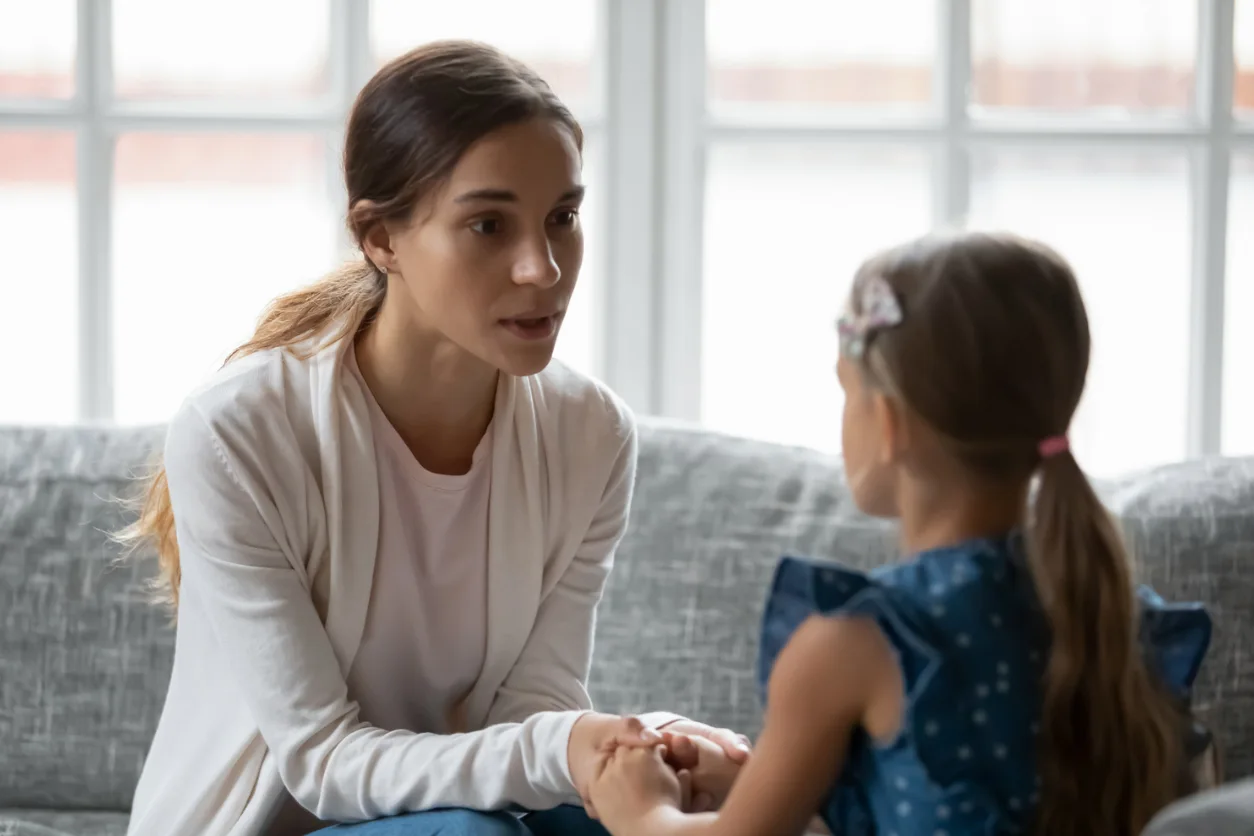
Whether you’re a parent, guardian, counsellor or family member, explaining addiction to a child can be one of the toughest conversations you’ll face.
Addiction is a sensitive topic that can feel overwhelming for adults, so it’s no surprise that the idea of explaining it to a child might seem even more challenging. However, children are often far more perceptive and aware of the world around them than we give them credit for.
Whether they’ve observed a family member struggling with addiction, heard things at school, or seen something on television, children may already have questions about addiction. It’s essential to provide them with clear, age-appropriate explanations that help them understand this problematic subject while offering reassurance and support.
This blog will explore the process of explaining addiction to a child, help you navigate their emotions, and give you tools to answer their questions in a way that is sensitive, clear, and constructive.
What is Addiction?
The first step in explaining addiction to a child is breaking down what addiction is in a way they can understand.
Addiction, in very simplified terms, is when a person feels like they need to do something or use something over and over again, even if it’s harmful to them. It’s an overwhelming feeling and compulsion where they can’t just “stop” doing it, even if they know it’s terrible for their health, their relationships, or their life.
For younger children, you might try to compare it to something they can relate to. For example, you could say, “Imagine you love playing your favourite video game. You play it so much that you stop doing other things you need to do, like going outside, eating dinner, or finishing your homework. Even when you know you should stop, you just keep playing. That’s a little like what addiction is, but it can happen with things that are even more harmful, like drugs or alcohol.”
For older children, you can provide a more in-depth explanation. You might be able to explain the more scientific parts of addiction, such as the fact that it changes the way a person’s brain works.
There are substances, like drugs or alcohol, that make people feel good for a little while. But after using them a lot, their brain starts to rely on those substances to feel normal. It becomes really hard for them to stop, even when they want to, and they may hurt themselves or the people around them because of their addiction.
Why Do People Get Addicted?
Once children understand what addiction is, the next logical question is often usually to do with the why. Why do people get addicted? This is an excellent opportunity to talk about the different reasons someone might fall into addiction. It’s important to emphasise that addiction is never a person’s choice or something they planned to happen. Addiction can affect anyone, and there are many reasons why someone might become addicted.
You might explain it in a discussion on how people try drugs or alcohol because they’re curious or because other people are doing it. But what they don’t realise is that those substances can change how their brains work.
For some people, it makes them want to keep using it, even though they know it’s not good for them. Other times, people might turn to drugs or alcohol because they’re feeling very sad, lonely, or stressed. They use those things to try to feel better, but instead, it makes things worse.
This could be a good moment to introduce the idea that addiction is like an illness, as it’s now many studies and medical associations define it as a disease. Explain that just like someone can get sick physically, their brain can also get ill and need help to get better. This helps reduce any stigma or shame associated with addiction and reinforces that it’s something that can be treated with the proper support.
How Addiction Affects Families
Children are often very tuned in to their surroundings, and if a family member or loved one is struggling with addiction, they may already sense that something is wrong. They might just not know or understand what that is yet.
It’s essential to address their feelings and validate their experiences without overwhelming them with too much information. You could explain that when someone you care about has an addiction, it can be really hard for their family and loved ones, too.
You could also discuss how that person might act differently than they used to and be less happy, or they might not spend as much time with their loved ones. This can make the people around them (such as them) feel sad, worried and even angry sometimes. Validate that for them.
It’s also important to explain that if someone in your family is struggling with addiction, it’s not their fault. Children can sometimes feel as though it might have been them who have done something wrong in an attempt to make sense of what’s happening around them. What’s critical here in these situations is reassurance.
Encourage children to share their feelings, ask questions, and express any fears they might have. Let them know that it’s okay to feel upset or confused and reassure them that they are not alone. Addiction can be a challenging and emotional experience for families, and it’s essential to create a safe space where children feel comfortable talking about what’s happening.
Answering Common Questions That Children Might Ask You
When talking to children about addiction, it’s common for them to have lots of questions.
Here are a few common questions they might ask and how you can respond in a way that’s honest and also age-appropriate.
Will they ever get better?
Yes, with the right help, people can get better. It might take some time, and they will need support from professionals like doctors or counsellors, but many people recover from addiction and go on to live a life where they are back in control.
Is it my fault?
No, it’s not your fault. Addiction is something that happens in the person’s brain, and nothing you did caused it. It’s important to know that you are not responsible for their addiction or for fixing it.”
Why can’t they just stop?
It might seem like they should just be able to stop, but addiction makes it really hard for them to quit on their own. Their brain has become dependent on the substance, and it takes time, treatment, and a lot of support for them to stop.
Are they going to hurt themselves or me?
Sometimes, people with addiction make choices that hurt themselves or others, not because they want to, but because their addiction is in control. If you ever feel unsafe, it’s really important to talk to a trusted adult about your feelings.
What can I do to help?
The best thing you can do is to take care of yourself and talk to someone if you’re feeling sad, scared, or confused. It’s not your job to fix the person, but you can consistently offer love and encouragement when they’re trying to get better.
General Tips for Explaining Addiction
Ultimately, the right time to talk about addiction depends on the child’s curiosity, their level of exposure, and their ability to understand the information healthily and constructively. Here’s some quick tips that should help you discuss this serious topic with a little one.
- Be Honest: Answer their questions truthfully without overloading them with too much information.
- Stay Calm: Your tone should be reassuring to prevent the child from becoming anxious or scared.
- Be Age-Appropriate: This is so important. Use simple language for younger children and more detailed explanations as they get older.
- Provide Reassurance: Let children know that addiction is treatable and that people can get help to recover.
- Open the Door to Communication: Encourage them to ask questions and make sure they feel safe doing so.
Seeking Help and Taking the Next Step
Explaining addiction to a child is not an easy thing to do. But it’s an important step in encouraging a level of understanding, compassion, and resilience.
Open, honest conversations about addiction can help children feel less anxious, more informed, and also more supported. It also creates a foundation for them to develop healthy attitudes toward substances as they grow older.
If you or someone you love is struggling with addiction, know that help is available. At Action Rehab, we’re here to provide the guidance, support, and care needed for recovery. Reach out to us if you need help or more advice about talking to children about addiction.
Need Addiction Support? Get in Touch Today
Talking to children about addiction requires patience, understanding, and sensitivity, but it’s a conversation that can make a huge difference in their lives. And if you or someone you know is struggling with addiction, don’t wait to get help.
At Action Rehab, we are committed to helping individuals and families heal from the impact of addiction. Our compassionate team of professionals can provide the care, support, and resources you need to start the journey toward recovery.
If you need help, guidance, or a listening ear, don’t hesitate to contact us today.
Posted on Friday, October 18th, 2024 at 2:30 pm in Addiction, Latest News.






 Call Us
Call Us Contact Us
Contact Us